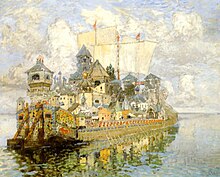Kitesch
Kitesch ( Russian Ки́теж ) was a legendary city in what is now Nizhny Novgorod Oblast in Russia .
The legend
Legend has it that Yuri II , Grand Duke of Vladimir, first built the city of Maly Kitesch (Little Kitesch) on the Volga - today's Krasny Cholm . Sometimes Maly Kitesch is also incorrectly identified with Gorodets , which was founded about 30 years before Juris was born. Later, the prince crossed the rivers Uzola River , Sanda and Kerzhenets River and found a gorgeous piece of land on the banks of Swetlojar Lake east of the present Semyonov , where he chose the city of Kitezh Bolshoi (Greater Kitezh) to start. It is widely believed that the city's name derives from the royal residence Kidekscha (near Suzdal ), sacked by the Tatars in 1237 .
After Batu Khan conquered part of Russia, he heard about Kitesh and ordered his army to go there. Maly Kitesch was quickly captured by the Tatars and Juri was forced to retreat to Bolshoi Kitesch. A prisoner revealed the secret route to Lake Svetlojar to the Tatars. The army of the Golden Horde pursued Yuri and soon reached the walls of the city. To the surprise of the Tatars, the city had no fortresses or anything like that. The locals never considered defending themselves and began to pray fervently for God's salvation. When the Tatars saw this, they started their attack, but had to stop suddenly. All around them, countless fountains of water suddenly began to gush out of the earth. The attackers had to back off and could only watch the city sink into a lake. The last thing they saw was the cross on the dome of the cathedral . Shortly afterwards only waves could be seen.
This legend gave the impetus for countless rumors that live on to this day. It is said that only those who are pure in heart and soul can find the way to Kitesch (ironically, the road to the lake is still called "Батыева тропа", Batu's path ). It is also said that when the weather is calm, the accusing chimes and the singing of the inhabitants from Lake Swetlojar can sometimes be heard. Some say that the most devout can see the light of religious processions (Russian крёстный ход, krjostny chod ) and even buildings at the bottom of the lake. That is why the Svetlojar Lake is sometimes called the "Russian Atlantis ".
Kitesch in art and science
Nikolai Rimsky-Korsakov's opera The Legend of the Invisible City of Kitesh and the Fevroniya Virgin (premiered in St. Petersburg in 1906 )
The city is mentioned in many works of Russian literature, for example in a poem by Anna Akhmatova , in a story by Vladimir Tendryakov and in a short story by Arkady and Boris Strugatski .
Soviet Antarctic explorers from Bellingshausen Station on King George Island named a lake near their station Lake Kitezh .
In the Werner Herzog documentary film Bells from the Deep from 1993, the myth about the town of Kitesch plays a role.
The asteroid (4188) Kitezh is named after the city. Coordinates: 56 ° 49 ′ 9 ″ N , 45 ° 5 ′ 30 ″ E
In the game Rise of the Tomb Raider from 2015, Kitesch is a setting for the action.
